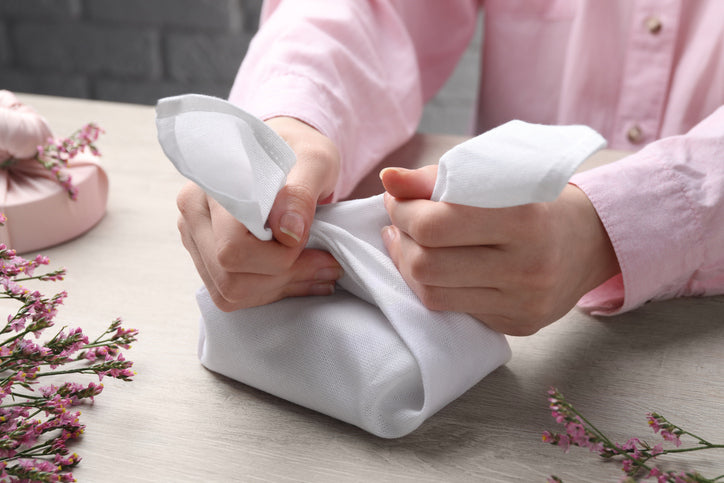
The Profound Meaning of "Musubi" – Interwoven with Japanese Spirituality
For us who love furoshiki, the word "musubi" holds special significance. In our daily lives, the act of tying something is not just a practical action but a moment where we can feel a deeper connection to the spirituality of Japan. When we tie a furoshiki, it’s not merely wrapping an object but symbolically binding people and hearts together.
In Japanese, the word "musubu" (to tie) has many meanings beyond just "tying a cord." It can also mean "to connect," "to gather," "to solidify," and "to create." For instance, when we say "to tie a bond" (ご縁を結ぶ), it refers to deepening relationships between people. Similarly, "mizuhiki," often used at weddings and special celebrations, signifies the tying of hearts and people together through its intricate knots.
In ancient Japan, tying was believed to hold special powers. Examples include the "shimenawa" (sacred ropes) seen at shrines and the custom of tying "omikuji" (fortunes) to trees. These actions are based on the belief that invisible powers reside in the knots, protecting and guiding us.
Interestingly, the concept of "musubi" originates from Japanese mythology, specifically the term "Musubi" (産霊). Musubi refers to the power of creation and the divine work of spirits. It represents how the act of binding brings forth sacred energy. This concept is deeply rooted in the Japanese worldview, respecting the harmony between all living things.
"Musubi" is also present in everyday words like "musuko" (son) and "musume" (daughter), derived from "musubi hiko" and "musubi hime." Thus, the spiritual significance of tying has been passed down through generations, embedded in our language and actions.
Experiencing the beauty of tying through furoshiki allows us to touch the depth of Japanese culture. When we tie a furoshiki, we don’t just wrap an item; we put our heart into it and feel the connection with others. The knot itself embodies Japan's spirituality, a reflection of the importance placed on human connection.
We hope to share this unique concept of "musubi" with people worldwide. Using furoshiki is not only about being eco-friendly but also about reconsidering our relationship with objects and the world around us. Through furoshiki, we believe we can spread the spirit of "musubi" and tie hearts together across the globe.
Now, what significance does a knot hold in your culture?
And we believe this ties into our own ism in a way.
